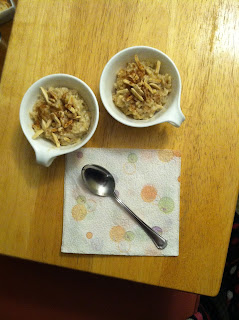 |
| Kutia in the pan |
 |
| Toasting almonds |
Tonight is Christmas Eve in the west, but I decided I wanted to try something eastern as a dessert following the candle light service this evening. So I went through my recipes searching for kutia, a Ukrainian dish traditionally served on Christmas Eve. To my dismay I found that I didn't actually have that recipe among all that I have collected.
I knew that it was made from wheatberries, dried fruits, honey and poppyseed; a mixture cooked in milk. Since I'd previously recognized its connection to another recipe, I turned to Feast From the Middle East by Faye Levy and looked up her recipe for Noah's Pudding.
She writes, "It is common in the vast region that was once the Ottoman Empire, especially in Turkey where Noah's Ark is said to have rested on Mount Ararat, near the borders of Armenia and Iran. (pg 358)" She also mentions that Bulgarians and Armenians serve it for Christmas, but then goes on to discuss how it appears throughout Muslim lands as far away as Egypt rather than the other places it appears in European cuisine.
She writes, "It is common in the vast region that was once the Ottoman Empire, especially in Turkey where Noah's Ark is said to have rested on Mount Ararat, near the borders of Armenia and Iran. (pg 358)" She also mentions that Bulgarians and Armenians serve it for Christmas, but then goes on to discuss how it appears throughout Muslim lands as far away as Egypt rather than the other places it appears in European cuisine.
 |
| Topped with almonds and cinnamon |
- Bulgaria – kolivo
- Greece – koliva
- Lebanon...and Jordan – ameh masslouk or snuniye
- Romania – colivä
- Russia – sochivo
- Serbia – koljivo
- Sicily – cuccia
- Syria – sliha or burbara (for Eid il-Bur-bara, St. Barbaras Feast throughout the Middle East)
The article further mentioned that Ukrainians call it
kolivo and prepare it without poppyseeds, for remembrance services. This version connects to Ukraine through Easter Orthodox funeral traditions, but I find myself wondering at the Christmas version with a name which is close only to the Sicilian name above.
This, of course, led to a further search for cuccia. Serious Eats by Sal Vaglica has both a recipe and his personal story of how that dish has figured in the life of his family as well as its roots in the history of Sicily. It is thought that the origin of the dish's name in Sicily came from the period in which that land was part of the Byzantine Empire, and thus the link with Kutiya in Ukraine in which the Byzantines had influence through the Orthodox church.
--> --> -->
Comments